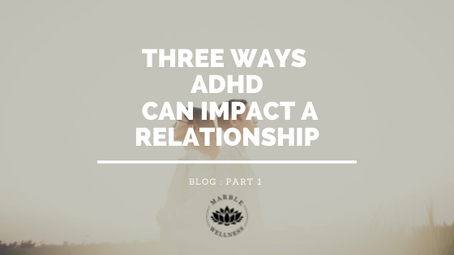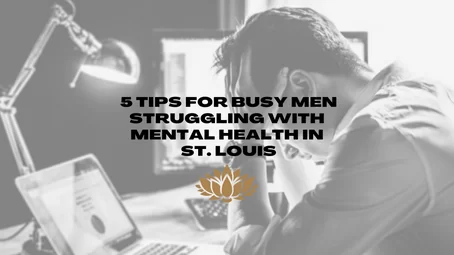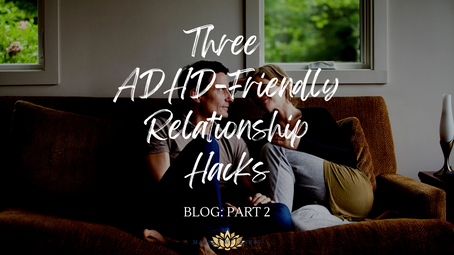Being in a relationship with a person who has ADHD can be fantastic. They’re often creative and surprising people with unique perspectives on the world. But there will be some challenges the two of you will have to navigate together to have a successful relationship. People with ADHD often experience challenges with organization, time management, and emotional regulation, which can cause complications. But if you’re aware of these challenges, you and your partner will be able to work through them together. Just by coming here to read this blog, you are learning and making an effort which is one of the most important things you can do in a relationship.
So, let’s get started on building that foundation of awareness!

Disclaimer: ADHD presents very differently based on the person. The information here is speaking about common symptoms but may not represent a person’s individual experience.
Challenge 1. Your house might always lean towards chaos
ADHD is divided into hyperactive or inattentive types, with some people presenting with a combination of both of those. No matter which subtype your partner has, they are probably dealing with executive functioning challenges, meaning that things like organizing, prioritizing, and remembering are difficult. Like, really difficult. This might look like your partner turning the hall table into a graveyard of papers instead of putting them away in a filing cabinet or going out to deep-clean the garage when you have family coming over. It might also mean that even though you’ve asked them three times to empty the trash cans in the bathroom, they’re still overflowing when the fourth time rolls around.

It’s important to remember that this neglect of chores isn’t a personal slight. It wasn’t done in an effort to make you mad, annoy you, sabotage the relationship, or test your love for the person. Your partner is not blowing you off; rather, they have legitimately forgotten that you asked, or they were doing something else and don’t realize it’s been four hours since they agreed to do the task. Assuming they want to help, they may just need support to navigate the situation. The two of you can develop strategies together to make things easier. It is, however, important that you don’t shame them for these behaviors; that will make things worse. It will be a different type of hurt caused and challenge to overcome. Instead, just talk things through, figure out a system that works for both of you, and give them grace and support.
Challenge 2. You feel like your partner doesn’t listen to you
When you’re trying to have a conversation and your partner is scrolling on their phone or looking for their keys, it’s easy to feel ignored. You know that you listen to their thoughts and issues and you both want and expect to receive the same in return.
People with ADHD are generally fabulous multitaskers, because they have to be. Their brains are moving in a dozen different directions and maintaining singular focus on one thing takes a monumental effort. At times, though, and especially in conversation, this can make you feel invalidated and unimportant. You might feel like they don’t care about you enough to prioritize you, and that can be hurtful.
Remember that this behavior likely isn’t intentional. Living in an ADHD brain can be an overwhelming experience. Thoughts buzz around at 50 miles an hour. It’s sometimes easier to focus on two things rather than trying to stay on just one. And zoning out can be a big problem. This doesn’t mean they don’t want to listen to you, they may just be struggling to stay engaged because of how their brain just works. Agreeing on the best ways for you to tell them you need their attention can help. And learning that listening might look different to them than it does to you. (There will be more on that in the next post!)
Challenge 3. Your partner might struggle with criticism
It’s inevitable that partners will give each other feedback. Sometimes this happens in a constructive way and sometimes not, and it’s not uncommon for this to be a source of friction. But if your partner has ADHD you both might find these encounters more stressful. They might get defensive, or become very sensitive to criticism or feedback, and the reaction might feel disproportionate to you.

Challenges with emotional regulation are a part of ADHD. Everything in the brain is running on high, and that includes emotions. The parts of ADHD brains responsible for emotional regulation are wired differently, which is its own separate biology lesson. This means your partner may be very emotionally intuitive, but easy to stir up. These regulation challenges are connected to impulse, and to another symptom often called rejection sensitivity (RS).
Rejection sensitivity is common in people with ADHD. No one likes to be criticized, but people with RS feel it even more deeply. Research is still being done on this, but our current understanding is that this is partially biology and partially a trauma response. People with ADHD spend a lot of their lives being criticized for not paying attention or being too much. Shame is powerful, and the longer a person lives with these negative comments, the stronger their reactions to criticism will be.
This doesn’t mean they can’t take accountability, but it does mean you’re going to need to handle conflicts more gently to avoid hurting someone you care about. This is another area where talking is important, and so is therapy, which can help them process their past trauma and learn new ways to engage.

It’s important to know that these are problems all couples deal with. The ADHD doesn’t create them, it just makes them more difficult to work through. But if you and your partner care about each other, you can find ways to navigate them successfully. The next blog in this series will give a little more information about these challenges and propose some strategies that you and your partner can try out together.
If you and your partner have been looking for some additional help, brainstorming, accountability, etc in managing ADHD in your relationship, or any other challenges you’ve been facing, please reach out to us today! Marble Wellness has couples counselors ready to partner with you and we’d love to hear from you!
Start Therapy for Mental Health in St. Louis
If you live in St. Louis and are ready to improve your mental health, we are here to help.
Contact Us!

Additional Counseling Services at Marble Wellness in St. Louis, MO and Chicago, IL
Counseling services designed to help set you on a path of living a more fulfilled, calm, and happy life.
St. Louis
Our St. Louis team of therapists have a variety of training backgrounds and areas of expertise. We specialize in anxiety, depression, grief, chronic illness, therapy for men, couples, and maternal overwhelm. We can also help new moms with various postpartum concerns, moms in the thick of parenting, and moms with teens. We can also chat from wherever you are in the state with online therapy in Missouri and online therapy in Illinois. No matter where you are in your journey, we would love to support you.
Chicago
Our Chicago team of therapists offer a wide range of mental health services to help our clients through the different challenges and hurdles in their life. In addition to anxiety, depression, grief, therapy for men, and maternal overwhelm, we are specialized in professional burnout, therapy for breakups, and love partnering with working moms.



